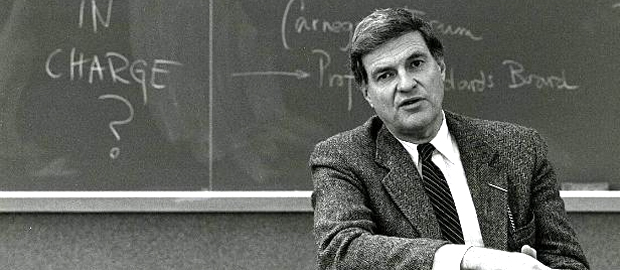Education forum honors the legacy of Ted Sizer
 Photo by John Foraste / Brown University; BrandeisNOW home page photo/Michael Shear
Photo by John Foraste / Brown University; BrandeisNOW home page photo/Michael ShearTed Sizer was ahead of his time, and his ideas that students and teachers could work collaboratively as equals and that education could move outside of the classroom were once viewed with a jaundiced eye. Revolutionary though those ideas seemed at first, by 1964 he was recognized as a significant education reformer and he became, at age 31, the youngest person ever named dean of Harvard’s Graduate School of Education. Subsequently, his ideas became more mainstream.
A conference dedicated to the memory and work of Sizer, who died last year, is being held from 8:45 a.m. until 2:00 p.m. Monday, October 4, in the Hassenfeld Conference Center. “Education As Transformation: Carrying on the Legacy of Ted Sizer” is open to the public. It is presented by the Spencer Program for Educational Research at Brandeis which, like Sizer, has explored learning both inside and outside the confines of the classroom.
For each of the six years that the Spencer program was funded, Sizer, who was the father of Brandeis General Counsel Judith R. Sizer, participated in the core seminar for Spencer students and faculty. Organizers of Monday’s conference say he is sorely missed.
The Spencer Program drew from a pool of PhD candidates representing a wide range of academic disciplines. What these scholars had in common was a keen interest not in "education," per se, but in "learning," and how learning intersects with their chosen areas of study.
Sharon Feiman-Nemser, the Mandel Professor of Jewish Education and director of the Mandel Center for Studies in Jewish Education, co-directed the Spencer program along with Joyce Antler, chair of the American Studies Program and Samuel Lane Professor of American Jewish History and Culture.
“We were trying to create a place for students serious about their disciplines who were interested in an education problem that they had in their discipline,” says Feiman-Nemser . “It was quite exciting to discover students who were hungry to talk about education in a rigorous and serious way.” With Spencer scholars coming from a variety of departments, the Spencer program provided “a second intellectual home,” says Antler.
Jonas Parker is a former high school math teacher and a Spencer scholar with a Social Policy Ph.D. from the Heller School for Social Policy and Management. He combined his math and social policy skills with his inspiration from the Spencer program to devise an unconventional approach to help the homeless get back on their feet by teaching them financial literacy. His Financial Education Toolkit capitalizes on the relationship of shelter workers to the homeless to do the teaching necessary for that.
Parker, who graduated from the Heller School in May, says the Spencer program made him think more broadly about how to teach, so he realized that homeless clients would be far more likely to discuss private financial woes with the shelter staff. “They are there all the time. They work on behalf of these clients day in and day out. Talking about money takes trust,” he said. Relying on the staff to teach financial literacy revealed an unexpected layer of learning. “The staff is not making big bucks. These are working class folks. They don’t necessarily know this stuff themselves and they can use it in their own lives.”
Ted Sizer inspired unconventional thinking. “He helped us think through the assumptions that we all have about what it means to provide education, what it means to be a teacher,” says Parker. “He was always bringing us back to the basic principles. Real fundamental stuff.”
Parker will be a panelist on Monday. Among the other 12 panelists will be anthropologist Rachana Sachin Agarwal, who has been observing elders on a remote Pacific island teaching youngsters language and culture in an effort to promote a fragile way of life. She also remembers Ted Sizer inspiring her work. “When some of us were struggling with writing proposals or figuring out our methodology, he said ‘look beyond your dissertation.’ He was good at motivating us to think beyond the little project we were working on and to think about the larger questions we were trying to answer.”
Panelist Laura Lorenz is a Senior Research Associate at the Institute for Behavioral Health of the Schneider Institutes for Health Policy at the Heller School. She says that Ted Sizer’s lessons are still with her. “Education is much more than what occurs in the classroom,” she says. “Students are not empty vessels waiting to be filled. Education is a mutual endeavor. Everybody is a learner and a teacher.”
Inquiries may be directed to Sandy Resnick at resnick@brandeis.edu or x (781) 735-2024.
Categories:





